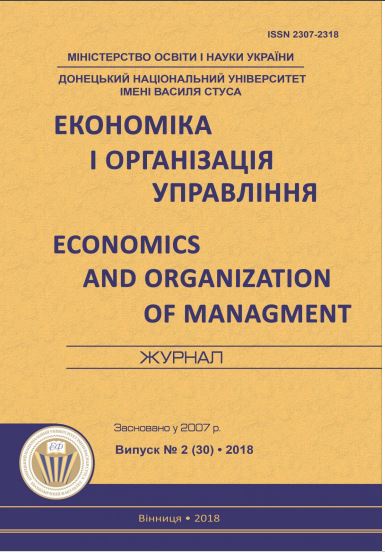Management of the processes of restructuring in the educational environment.
DOI:
https://doi.org/10.31558/2307-2318.2018.2.7Keywords:
restructuring processes, high-tech services, information system, informatization, factors of innovation developmentAbstract
In the work the theoretical bases of management of restructuring processes in the educational environment are analyzed. The notion of "restructuring", "types of restructuring", "information technologies", "innovations in information environments" is described, the essence of combination and interaction of restructuring and information innovative technologies is disclosed. The structural components of restructuring processes in educational environments based on the capabilities of computer systems from technical, economic and other points of view are characterized and the use of modern scientific and technical means and restructuring methods is grounded. The scientific achievements of specialists of technical, economic, and pedagogical direction concerning the restructuring of existing generally accepted methods of restructuring are described. The main directions of restructuring in educational institutions at different stages of educational activity, social work and innovative creative processes are highlighted.
The socio-economic situation of today is such that only highly skilled energetic specialists are competitive. Current technological progress is rapidly arranged by modern technologies by modern enterprises and, accordingly, requires knowledge of the specialists which should be at the appropriate level.
Professional skills of the specialists of the economic profile (economists, system analysts, managers of higher levels) are complex, diverse, require a deep and varied knowledge, skills, abilities, a well-defined system of key and professional knowledge and forms the basis for future restructuring.
References
Андрушкін Б. До теоретичних основ організації управління реструктуризацією підприємств в умовах суспільних трансформацій (Аспекти регламентації фінансовоекономічної діяльності господарських формувань Економічною КонституцієюУкраїни / Б.Андрушкін, Н. Кирич, О. Погайдак// Экономика Крыма. - 2012. - №3(41).
Дем’яненко В. М. Методичні рекомендації з оцінювання якості електронних засобів і ресурсів у навчально-виховному процесі [Електронний ресурс] / В. М. Дем’яненко, М. П. Шишкіна // Інформаційні технології і засоби навчання. – 2011. – №6 (26). – Режим доступу до журналу: http://www.journal.iitta.gov.ua.
Башмаков М. И. Информационная среда обучения / М. И. Башмаков, С. Н. Поздняков, Н. А. Резник. – Пб. : СВЕТ, 1997. – 400 с.
Воронов А. И. Философский анализ понятия «виртуальная реальность»: дисс. ... канд. филос. наук: 09.00.08 / Воронов Андрей Игоревич. – СПб., 1999. – 197 с.
Говорухин В. Компьютер в математическом исследовании / В. Говорухин, В Цибулин. –М.: Питер, 2011. – 619c.
Маснева М. Ф. Технология организации профессиональной подготовки менеджера вусловиях виртуального учебно-тренировочногоцентра: дисс. ... канд. пед. наук: 13.00.08 /Маснева Марина Федоровна. – Тамбов, 2015. – 196 с.
Коротков А. М. Теоретико-методическая система подготовки учащихся к обучениюв компьютерной среде: дисс. … доктора пед. наук : 13.00.01 / Коротков Александр Михайлович. – Волгоград, 2004. – 361 с.
Казаков Ю.М. Педагогічні умови застосування медіаосвіти в процесі професійної підготовки майбутніх учителів : автореф. на здобуття наук. ступеня канд. … пед. наук. : 13.00.04 / Ю. М. Казаков. – Луганськ, 2007. – 20 с.
Santostefano S. Cognitive Controls, Metaphors and Contexts. An Approach to Cognition and Emotion // Bearson D.J., et al. (Eds.) / Developmental Perspectives. — 1986. — 162 p.
Пєхарєва С. В. Управління інноваційним розвитком дошкільного навчального закладу : автореф. дис … канд. Пед. Наук
Хитра О.В. Менеджмент продуктивності. [Електронний ресурс]. Режим доступу: http://dn.khnu.km.ua/dn/k_default.aspx?M=k0155&T=03_3&lng=1&st=0

